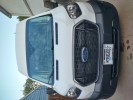Grounding Your Camper
Hi Bruce
First you said this
Get the cord that Tom showed a picture of, use the tester and you'll be fine. You have more chance of dying in an auto wreck on the way to the campground than you do from the 120V if you use reasonable caution.
Bruce
Now this is an extension cord and is not covering the chassis and skin with bonded to earth/Ground, so to me this is you advocating breaking code,Tehn you change your mind with the next quote, even you are disagreeing with your earlier reccomendation.
my opinion is that you should ground the frame and you should ground the metal skin, for all the reasons discussed above. A live wire may never, ever come in contact with the skin but a wire to ground it is cheap and easy and it should keep you from being lit up.
First you tell me I am wrong for disagreeing with ya and then you agree with me.
First you said this
Get the cord that Tom showed a picture of, use the tester and you'll be fine. You have more chance of dying in an auto wreck on the way to the campground than you do from the 120V if you use reasonable caution.
Bruce
Now this is an extension cord and is not covering the chassis and skin with bonded to earth/Ground, so to me this is you advocating breaking code,Tehn you change your mind with the next quote, even you are disagreeing with your earlier reccomendation.
my opinion is that you should ground the frame and you should ground the metal skin, for all the reasons discussed above. A live wire may never, ever come in contact with the skin but a wire to ground it is cheap and easy and it should keep you from being lit up.
First you tell me I am wrong for disagreeing with ya and then you agree with me.
-

GeorgeTelford - 500 Club
- Posts: 677
- Joined: Mon Jul 11, 2005 2:10 pm
GeorgeTelford wrote:Hi Bruce
First you said this
Get the cord that Tom showed a picture of, use the tester and you'll be fine. You have more chance of dying in an auto wreck on the way to the campground than you do from the 120V if you use reasonable caution.
Bruce
George,
If you remember from the rest of the post that Warpony said he didn't want to use a breaker or wiring in his trailer, only an extension cord. The he decided he didn't want any 120V after all the discussion of electrocution. I just wanted to point out that I felt the yellow cord was safe enough, given all the other risks we take in our life, to use. The yellow cord has a ground wire, GFCI and overload protection; everything that is required by the NEC for a hardwired installation. The only thing it lacks is a bond to the trailer frame. Yes, it would be a bit safer if there was a bond but the GFCI would have to fail, the cord insulation would have to be cut, the insulation on the hot wire would have to be cut and the hot wire would have to be touching metal to energize the frame. I find it hard to believe that the cord can't be used safely, especially if you examine the cord before using it.
GeorgeTelford wrote:Now this is an extension cord and is not covering the chassis and skin with bonded to earth/Ground, so to me this is you advocating breaking code,Tehn you change your mind with the next quote, even you are disagreeing with your earlier reccomendation.
my opinion is that you should ground the frame and you should ground the metal skin, for all the reasons discussed above. A live wire may never, ever come in contact with the skin but a wire to ground it is cheap and easy and it should keep you from being lit up.
First you tell me I am wrong for disagreeing with ya and then you agree with me.
I guess I could have made this more clear. I highly recommend grounding the frame and metal skin on a trailer with a hardwired installation. There's really no good reason not to do since its easy enough to do and it can save you from potentially being electrocuted. As a point of minutiae I might add that the ground wire isn't required for GFCI outlets to function properly but it is an NEC requirement for safety reasons. So yeah, I disagree and I agree with you.

Bruce
2009 6.5'X11' TTT - Boxcar
All it takes is a speck of faith and a few kilowatts of sweat and grace.

Boxcar Build
aVANger Build
All it takes is a speck of faith and a few kilowatts of sweat and grace.

Boxcar Build
aVANger Build
-

bdosborn - Donating Member
- Posts: 5494
- Images: 772
- Joined: Wed May 05, 2004 11:10 pm
- Location: CO, Littleton



